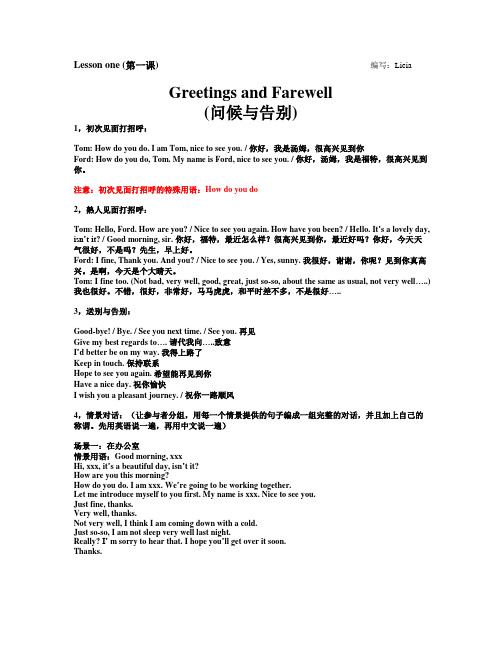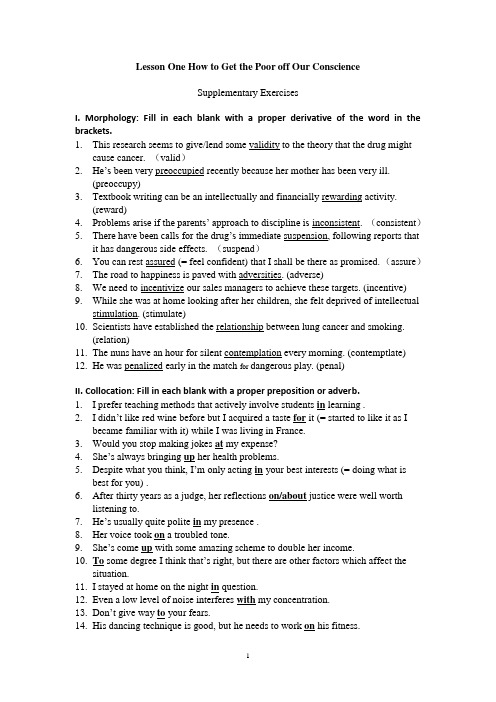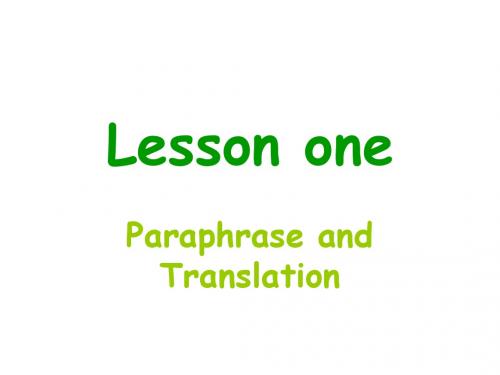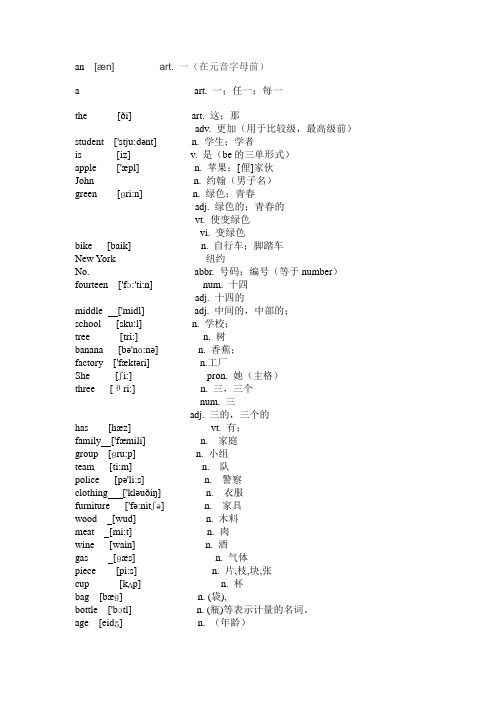Lesson One
- 格式:ppt
- 大小:115.50 KB
- 文档页数:6

Lesson one (第一课) 编写:LiciaGreetings and Farewell(问候与告别)1,初次见面打招呼:Tom: How do you do. I am Tom, nice to see you. / 你好,我是汤姆,很高兴见到你Ford: How do you do, Tom. My name is Ford, nice to see you. / 你好,汤姆,我是福特,很高兴见到你。
注意:初次见面打招呼的特殊用语:How do you do2,熟人见面打招呼:Tom: Hello, Ford. How are you? / Nice to see you again. How have you been? / Hello. It’s a lovely day, isn’t it? / Good morning, sir. 你好,福特,最近怎么样?很高兴见到你,最近好吗?你好,今天天气很好,不是吗?先生,早上好。
Ford: I fine, Thank you. And you? / Nice to see you. / Yes, sunny. 我很好,谢谢,你呢?见到你真高兴。
是啊,今天是个大晴天。
Tom: I fine too. (Not bad, very well, good, great, just so-so, about the same as usual, not very well…..)我也很好。
不错,很好,非常好,马马虎虎,和平时差不多,不是很好…..3,送别与告别:Good-bye! / Bye. / See you next time. / See you. 再见Give my best regards to…. 请代我向…..致意I’d better be on my way. 我得上路了Keep in touch. 保持联系Hope to see you again. 希望能再见到你Have a nice day. 祝你愉快I wish you a pleasant journey. / 祝你一路顺风4,情景对话:(让参与者分组,用每一个情景提供的句子编成一组完整的对话,并且加上自己的称谓。

《Lesson One》学历案一、学习主题“开启知识之旅:基础概念的探索”二、学习目标1、理解并掌握本课程的核心概念和关键术语。
2、能够运用所学知识解决简单的实际问题。
3、培养积极的学习态度和良好的学习习惯。
三、学习资源1、教材:《_____教材名称》2、在线课程:_____课程网站链接3、参考书籍:《_____参考书名》四、学习过程(一)课前预习1、阅读教材的相关章节,了解本次课程的大致内容。
2、尝试回答教材中的预习问题,记录自己的疑惑。
(二)课堂学习1、概念讲解教师通过实例、图表等方式,清晰地阐述课程中的核心概念,如_____、_____等。
学生认真听讲,做好笔记,积极思考,提出问题。
2、小组讨论学生分成小组,针对某个概念或问题进行讨论。
小组代表发言,分享小组讨论的结果。
3、案例分析教师给出实际案例,学生运用所学知识进行分析和解决。
各小组展示分析结果,教师进行点评和总结。
4、课堂练习学生完成课堂练习题,巩固所学知识。
教师巡视,及时给予指导和帮助。
(三)课后复习1、完成教材中的课后作业,加深对知识的理解和掌握。
2、复习课堂笔记,整理思路,总结重点和难点。
3、阅读参考书籍中的相关内容,拓展知识面。
五、学习评价1、课堂表现:包括参与度、发言质量、小组合作等。
2、作业完成情况:按时完成作业,作业质量高。
3、测验成绩:定期进行小测验,检测学生对知识的掌握程度。
六、学习反思1、学生反思学生回顾自己在本次课程中的学习过程,总结自己的收获和不足。
针对不足之处,制定改进措施,明确下一次课程的学习目标。
2、教师反思教师根据学生的学习情况,反思教学过程中的优点和不足之处。
针对存在的问题,调整教学策略和方法,提高教学质量。
在这第一课中,我们为后续的学习打下了坚实的基础。
通过对核心概念的深入理解,小组讨论中的思维碰撞,案例分析中的实际应用,以及课后的复习巩固,希望同学们能够真正掌握所学知识,并将其运用到实际生活和学习中。

Lesson One How to Get the Poor off Our ConscienceSupplementary ExercisesI. Morphology: Fill in each blank with a proper derivative of the word in the brackets.1.This research seems to give/lend some validity to the theory that the drug mightcause cancer. (valid)2.H e’s been very preoccupied recently because her mother has been very ill.(preoccupy)3.Textbook writing can be an intellectually and financially rewarding activity.(reward)4.Problems arise if the parents’ approach to discipline is inconsistent. (consistent)5.There have been calls for the drug’s immediate suspension, following reports thatit has dangerous side effects. (suspend)6.You can rest assured (= feel confident) that I shall be there as promised. (assure)7.The road to happiness is paved with adversities. (adverse)8.We need to incentivize our sales managers to achieve these targets. (incentive)9.While she was at home looking after her children, she felt deprived of intellectualstimulation. (stimulate)10.Scientists have established the relationship between lung cancer and smoking.(relation)11.The nuns have an hour for silent contemplation every morning. (contemptlate)12.He was penalized early in the match for dangerous play. (penal)II. Collocation: Fill in each blank with a proper preposition or adverb.1.I prefer teaching methods that actively involve students in learning.2.I didn’t like red wine before but I acquired a taste for it (= started to like it as Ibecame familiar with it) while I was living in France.3.Would you stop making jokes at my expense?4.She’s always bringing up her health problems.5.Despite what you think, I’m only acting in your best interests (= doing what isbest for you) .6.After thirty years as a judge, her reflections on/about justice were well worthlistening to.7.He’s usually quite polite in my presence.8.Her voice took on a troubled tone.9.She’s come up with some amazing scheme to double her income.10.To some degree I think that’s right, but there are other factors which affect thesituation.11.I stayed at home on the night in question.12.Even a low level of noise interferes with my concentration.13.Don’t give way to your fears.14.His dancing technique is good, but he needs to work on his fitness.15.Police dogs can discriminate between the different smells.16.This car has an engine replete with the latest technology.17.She was given to staying in bed till lunchtime.18.The unions assured the new owners of the workers’ loyalty to the company.19.They were seduced into buying the washing machine by the offer of a free flightto the United States.20.The pickpocket delicately relieved him of his wallet.21.Her preference is for comfortable rather than stylish clothes.22.The paper charged her with using the company’s money for her own purposes.23.The beauty of air travel consists in its speed and ease.24.When she didn’t answer the telephone, I resorted to standing outside her windowand calling up to her.25.Although richer people may be more likely to express a desire to migrate within agiven country, the reported desire to migrate is also higher in poorer countries as compared with richer countries.26.The company resolved to take no further action against the thieves.27.Sales have fallen badly this year, to the extent that we will have to close some ofour shops.28.I suppose it’s because I live in a city that I have this yearning for open spaces.(yearn)III. Synonym discrimination: Discriminate the differences in meaning between the synonyms and fill in each blank with the best choice.1. The family have a history of mental disorder. (ailment disease disorder) Ailment, disease and disorder all mean a deranged bodily state usually associated with or amounting to a loss of health. Disease in its usual and broadest use implies an impairment of the normal state of the living body or of one or more of its parts marked by disturbance of vital functions and usually traceable to a specific cause. Disorder is commonly interchangeable with disease but typically it stresses the disordered state without regard to the cause. Ailment often suggests a trivial or chronic disorder.2. Should the opportunity arise, I’d love to go to China. (arise rise)Rise and arise mean to move or come up from a lower to a higher level. Rise is used in reference to persons or animals that get up from a lying or sitting position or to things that seem to come up into view or to lift themselves up. Arise comes close to rise but is somewhat more rhetorical or poetic.3. They were debating the proposition that “All people are created equal”. (proposal proposition)Proposal and proposition are comparable when they denote something which is proposed to another for consideration. Proposal usually carries a clear suggestion of the act of proposing; thus one receives a proposal, or entertains a proposal, or listens to a proposal. It also commonly implies an offer. Proposition applies primarily to ausually affirmative statement that is propounded for discussion, argument, proof, or disproof.4. The final answer to this question is still to be found. (last eventual final) Last, eventual and final are comparable when they mean following all the others in time or order or in importance. What is last comes at the end of a series, especially of things of the same kind or class; the term usually implies that no more will follow or have followed. What is final definitely closes a series or process not only because it is the last in order of individuals or details but because it is decisive or conclusive. What is eventual is bound to follow as the final effect of causes already in operation or of causes that will be operative if a given or understood contingency occurs.5. The artisan, for example, ranks no doubt lower than the professional man; but no one maintains that he is a different kind of being. (maintain assert justify) Maintain, assert and justify are comparable when they mean to uphold as true, right, just, valid, or worthy of notice or acceptance in the face of opposition. When this implication is the only one, maintain usually means to argue in the spirit of one who does not admit any weakness in his contention. Often, however, the term additionally implies persistence or insistency in upholding in defiance of all opposition. Assert so strongly implies a determination to make others accept or recognize what one puts forward as the truth, or as a claim, or as a right, that it often suggests aggressiveness or obtrusiveness. Justify implies that the thing concerned can no longer be oppsed or ignored because it has been conclusively shown to be true, valid, or proper by irrefutable arguments or on inescapable grounds, such as its consequences or its successful operation.6. Able boys and girls will submit willingly to severe discipline in order to acquire some coveted knowledge or skill. (able competent capable qualified)Able, competent, capable and qualified are close synonyms when they denote having marked power or fitness for work and are used attributively. Able suggests ability markedly above the average; it often connotes power of mastery; it does not exclude the connotation of promise even when the emphasis is on performance. Capable stresses possession of qualities such as adaptability, resourcefulness, versatility, industry, or efficiency and seldom indicates, apart from its context, the specific ability involved. Competent and qualified are used especially to characterize a person or his activities in relation to a specific calling. Competent implies the ability to satisfy capably all the special demands or requirements of a particular situation, craft, or profession, but it does not necessarily imply, as qualified usually does, compliance with set standards such as special training and the testing of one’s competence at the end of such training.7. Few men are placed in such fortunate circumstances as to be able to gain office. (Get obtain procure gain )Get, obtain, procure and gain are often interchangeable when they mean to come intopossession of. Get is very general in its meaning and simple and familiar in its use. Obtain may suggest that the thing sought has been long desired or that it has come into possession only after the expenditure of considerable effort or the lapse of considerable time. Procure is likely to suggest planning and contriving over a period of time and the use of unspecified or sometimes questionable means. Gain often implies competition in acquiring something of value.8. The universe is presumed to contain many other planets with some form of life. (presuppose presume assume)Presuppose, presume and assume are comparable when they mean to take something for granted or as true or existent especially as a basis for action or reasoning. Presuppose, the most inclusive of these words, need not imply dubiousness about what is taken for granted. Presume may imply conjecture but ordinarily carries the implication that whatever is taken for granted is entitled to belief until it is disproved. Assume stresses the arbitrary acceptance as true of something which has not yet been proved or demonstrated or about which there is ground for a difference of opinion. 9. The hotel is in a tranquil rural setting. (calm tranquil peaceful)Calm, tranquil and peaceful all mean quiet and free from all that disturbs or excites. Calm is primarily applied to sea or weather, usu conveys an implicit contrast with its opposite: stormy, and suggests freedom, real or assumed, from agitation of whatever sort. Tranquil implies a more settled composure, a more inherent quiet, than calm with less suggestion of previous agitation overcome. Peaceful implies repose or the attainment of undisturbed tranquility.。


an [æn] art. 一(在元音字母前)a art. 一;任一;每一the [ði] art. 这;那adv. 更加(用于比较级,最高级前)student ['stju:dənt] n. 学生;学者is [iz] v. 是(be的三单形式)apple ['æpl] n. 苹果;[俚]家伙John n. 约翰(男子名)green [ɡri:n] n. 绿色;青春adj. 绿色的;青春的vt. 使变绿色vi. 变绿色bike [baik] n. 自行车;脚踏车New Y ork 纽约No. abbr. 号码;编号(等于number)fourteen ['fɔ:'ti:n] num. 十四adj. 十四的middle ['midl] adj. 中间的,中部的;school [sku:l] n. 学校;tree [tri:] n. 树banana [bə'nɑ:nə] n. 香蕉;factory ['fæktəri] n.工厂She [ʃi:] pron. 她(主格)three [θri:] n. 三,三个num. 三adj. 三的,三个的has [hæz] vt. 有;family ['fæmili] n. 家庭group [ɡru:p] n. 小组team [ti:m] n. 队police [pə'li:s] n. 警察clothing ['kləuðiŋ] n. 衣服furniture ['fə:nitʃə] n. 家具wood [wud] n. 木料meat [mi:t] n. 肉wine [wain] n. 酒gas [ɡæs] n. 气体piece [pi:s] n. 片,枝,块,张cup [kʌp] n. 杯bag [bæɡ] n. (袋),bottle ['bɔtl] n. (瓶)等表示计量的名词。

a o e i u üb p m f d t n l g k h j q x zh ch sh r zc s y wai ei ui ao ou iu ie üe er an en in un ün ang eng ing ongzhi chi shi ri zi ci si yi wu yu ye yue yuan yin yun ying顺序a o e i u üb p m f d t n g k h j q x zh ch sh r z s y w ai ei ui ao ou iu ie ue er an en in un ün ang eng ing ongzhi chi ri zi ci ri ye yue ying yuan yi wu yu yinLesson One1. I see.我明白了。
Wo ming bai le2. I quit! 我不干了! Wo bu gan le3. Let go! 放手! Fang shou4. Me too.我也是。
Wo ye shi5. My god! 天哪! Tian a6. No way! 不行! Bu xing7. Come on.来吧(赶快) lai ba!(gan kuai)8. Hold on.等一等。
Deng yi deng9. I agree。
我同意。
Wo tong yi10. Not bad.还不错。
Hai bu cuo11. Not yet.还没。
Hai mei12. See you.再见。
Zai jian13. Shut up! 闭嘴! Bi zui14.Hello! 你好ni hao15. Why not? 好呀! (为什么不呢?) hao ya! Wei shen me bu ni?16. Allow me.让我来。
Rang wo lai17. Be quiet! 安静点! An jing dian18. Cheer up! 振作起来! Zhen zuo qi lai19. Good job! 做得好! Zuo de hao20. Have fun! 玩得开心! Wan de kai xin!。